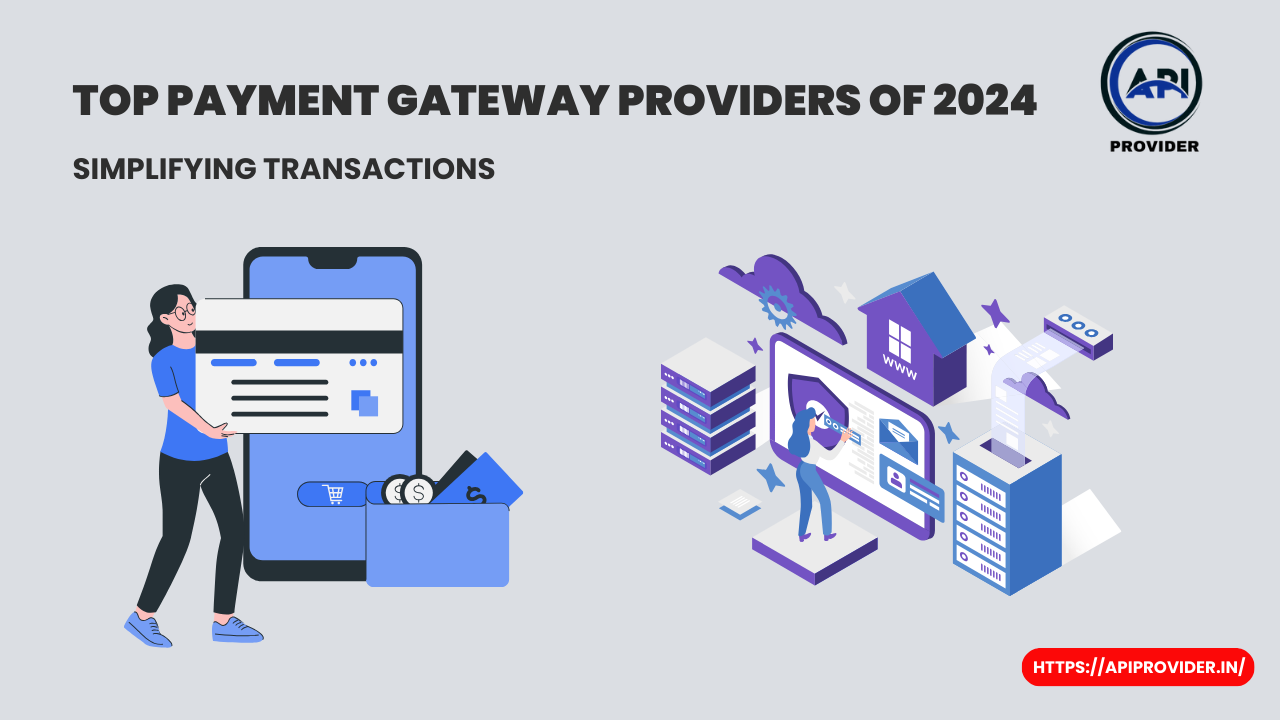Top Payment Gateway Providers of 2024: In today’s fast-paced digital world, having a reliable payment gateway is crucial for any business. A robust payment gateway not only ensures seamless transactions but also enhances customer satisfaction and trust. With 2024 well underway, it’s time to take a closer look at the top payment gateway providers simplifying transactions and making life easier for merchants and consumers alike.

Understanding Payment Gateways
Before diving into the top providers, let’s briefly understand what a payment gateway is. Essentially, a payment gateway is a technology that captures and transfers payment data from the customer to the acquiring bank. It acts as the digital equivalent of a point-of-sale terminal found in brick-and-mortar stores, ensuring secure and efficient transactions online.
Why Choosing the Right Payment Gateway Matters
Selecting the right payment gateway is vital for several reasons:
- Security: Protects sensitive customer information.
- Reliability: Ensures your transactions are processed without interruptions.
- Speed: Provides quick transaction processing to enhance customer experience.
- Cost Efficiency: Helps manage transaction fees and costs effectively.
Now, let’s explore the top payment gateway providers of 2024 that are leading the charge in simplifying transactions.
Read More..
- Verify Aadhaar Details With API Provider
- What is Contactless Payment and How Does It Work With Examples?
1. PayPal
Overview
PayPal remains a dominant player in the payment gateway market. Known for its user-friendly interface and global reach, PayPal is a favorite among both businesses and consumers.
Key Features
- Global Acceptance: Supports multiple currencies and is widely accepted.
- Ease of Use: Simple integration and user-friendly experience.
- Security: Robust fraud prevention and buyer protection policies.
Pros and Cons
Pros:
- High customer trust and recognition.
- Comprehensive protection policies.
- Easy to set up and use.
Cons:
- Higher transaction fees compared to some competitors.
- Limited customization options.
2. Stripe
Overview
Stripe has carved out a niche for itself with its powerful API and extensive customization capabilities, making it a preferred choice for developers and tech-savvy businesses.
Key Features
- Developer-Friendly: Highly customizable with advanced API.
- Recurring Payments: Supports subscription billing and recurring payments.
- Global Reach: Multi-currency support and international payment options.
Pros and Cons
Pros:
- Flexible and highly customizable.
- Transparent pricing structure.
- Excellent developer tools and documentation.
Cons:
- Can be complex for non-technical users.
- Customer support can be limited.
3. Square
Overview
Square is known for its simplicity and versatility, particularly for small to medium-sized businesses. Its all-in-one solutions, including hardware and software, make it a comprehensive choice.
Key Features
- Integrated POS: Combines payment processing with point-of-sale solutions.
- Analytics: Provides detailed sales reports and analytics.
- Competitive Pricing: Transparent and affordable pricing plans.
Pros and Cons
Pros:
- Easy to set up and use.
- Affordable pricing with no hidden fees.
- All-in-one solutions for various business needs.
Cons:
- Limited international availability.
- May not be suitable for large enterprises.
4. Authorize.Net
Overview
As one of the oldest payment gateways, Authorize.Net offers a reliable and secure platform with a range of features that cater to both small and large businesses.
Key Features
- Advanced Security: Strong fraud detection and prevention tools.
- Recurring Billing: Supports subscription services.
- Extensive Integration: Compatible with a wide range of platforms and services.
Pros and Cons
Pros:
- High reliability and uptime.
- Comprehensive security features.
- Good customer support.
Cons:
- More complex setup process.
- Higher transaction fees.
5. Adyen
Overview
Adyen is a global payment company known for its wide range of payment methods and currencies, making it ideal for businesses with an international customer base.
Key Features
- Global Reach: Supports numerous payment methods and currencies.
- Omnichannel Solutions: Integrates online, in-app, and in-store payments.
- Advanced Analytics: Provides detailed insights and reporting.
Pros and Cons
Pros:
- Extensive international support.
- Comprehensive payment options.
- Advanced analytics and fraud prevention.
Cons:
- Higher setup costs.
- Best suited for larger enterprises.
How to Choose the Right Payment Gateway Provider
Selecting the best payment gateway for your business involves considering several factors:
Assess Your Business Needs
Understand your business model, target market, and transaction volume. For example, a small business might benefit from the simplicity and affordability of Square, while a tech-heavy company might prefer the flexibility of Stripe.
Compare Features and Costs
Evaluate the features offered by different gateways and weigh them against their costs. Consider aspects like transaction fees, monthly fees, and setup costs.
Consider Customer Preferences
Choose a gateway that supports the payment methods preferred by your customers. Offering multiple payment options can enhance the customer experience and boost conversion rates.
Prioritize Security
Ensure the payment gateway complies with industry standards like PCI-DSS and offers robust fraud prevention tools to protect your business and customers.
Conclusion
The right payment gateway can make or break your business’s online transaction process. By understanding the key features and pros and cons of top providers like PayPal, Stripe, Square, Authorize.Net, and Adyen, you can make an informed decision that aligns with your business needs and goals. Whether you prioritize security, customization, or ease of use, there’s a payment gateway out there that’s perfect for you.
FAQs
1. What is the best payment gateway for small businesses?
Square and PayPal are often recommended for small businesses due to their ease of use and comprehensive solutions.
2. Can I use multiple payment gateways on my website?
Yes, integrating multiple payment gateways can offer flexibility and cater to a wider range of customer preferences.
3. How do payment gateway fees work?
Payment gateway fees typically include a setup fee, transaction fees, and sometimes a monthly fee. These fees can vary depending on the provider.
4. What is the difference between a payment gateway and a payment processor?
A payment gateway facilitates the transfer of payment data between the customer and the merchant, while a payment processor handles the transaction between the merchant and the customer’s bank.
5. How can I ensure my payment gateway is secure?
Choose a payment gateway that complies with PCI-DSS standards, offers SSL encryption, and includes fraud detection tools.
